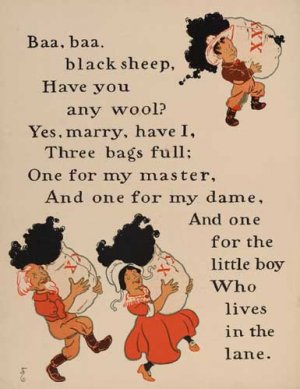Baa baa black sheep 'cancelled': Have nursery rhymes been overly sanitised?
- Replies 37
Baa baa black sheep 'cancelled': Have nursery rhymes been overly sanitised?
A recent discussion on an Australian forum, Whirlpool, has brought to light the issue of whether or not nursery rhymes have been ‘sanitised’ to the point of being boring.
The original poster claimed to have found a book of nursery rhymes from 50 years ago, and that the same songs printed today are much less interesting. They provided the example of “There was an old woman who lived in a shoe”, which they said has been changed from “She fed them some broth, without any bread, and whipped them all soundly and put them to bed” to “She fed them some broth, and plenty of bread, then kissed them all sweetly and put them to bed”.
Some people commenting agreed that the older version is more interesting and that by sanitising these classic songs they lose their humour, entertainment value, and even the lessons they often try to impart: “That original kinda had a moral, that if you had too many kids then you wouldn't be able to look after them properly and they would inevitably be treated poorly.”
Others disagreed, arguing that the older versions are often violent or offensive, and that it is better to err on the side of caution when it comes to children’s content.
One commenter said that the change instituted at some kindergartens from “baa baa black sheep” to “baa baa rainbow sheep” is an example of political correctness gone too far, as it spoils the poetic rhythm and dumbs the song down.

In the case of baa baa black sheep, the controversy began in the 1980s and 1990s
when a few parents in the United Kingdom complained that their children
were being taught a song that alluded to slavery.
Credits: 1901 edition of Mother Goose
“10 years ago when I first used child care baa baa black sheep was banned because they said it was racist.
Better hide that book, it's probably been cancelled already.”
"Mother Goose" was also mentioned, with one person arguing that the original version of “Old Mother Goose and the Golden Egg” is anti-Semitic, as it features a Jewish character who is described as a “rogue” and a “villain”.
Another said that they are glad they grew up before political correctness “stifled” free speech and free thinking.
"I find it hard to admit that I'm now on the wrong side of three score and ten years old, but I am really glad that I lived my childhood when I did, in the time when all this silly "correctness" didn't exist. I was brought up listening to and learning all those old nursery rhymes and fairy tales that you now condemn. They had no ill effects on me or my brothers, my mother wasn't mad, she never whipped us, nobody took offence at the rhymes, nobody considered them violent. and nobody considered them representative of real life," said one commenter.
Better hide that book, it's probably been cancelled already.”
"Mother Goose" was also mentioned, with one person arguing that the original version of “Old Mother Goose and the Golden Egg” is anti-Semitic, as it features a Jewish character who is described as a “rogue” and a “villain”.
Another said that they are glad they grew up before political correctness “stifled” free speech and free thinking.
"I find it hard to admit that I'm now on the wrong side of three score and ten years old, but I am really glad that I lived my childhood when I did, in the time when all this silly "correctness" didn't exist. I was brought up listening to and learning all those old nursery rhymes and fairy tales that you now condemn. They had no ill effects on me or my brothers, my mother wasn't mad, she never whipped us, nobody took offence at the rhymes, nobody considered them violent. and nobody considered them representative of real life," said one commenter.
Another respondent mentioned Enid Blyton's books, which they said were also 'cleaned' and 'modernised' for today's readers.
But with the original versions of these classic nursery rhymes often containing violence, racism, or offensive language, do they still have a place in today's society, or have they been rightfully ‘cleaned up’?
One user felt the issue was overblown. "I think it's easy to put the silliest examples of political correctness (the baa baa example is stupid if true) in with genuine attempts to make content safer for children. A lot of old stories, nursery rhymes, songs and other material contains really offensive, racist, violent content that you'd be mad to expose a child to now that we know how harmful it is to their development. Of course, it's a scale and that balancing act is up to parents to decide," they said.
What do you think? Have nursery rhymes been sanitised to the point of being boring, or is it better to err on the side of caution? Let us know in the comments.







